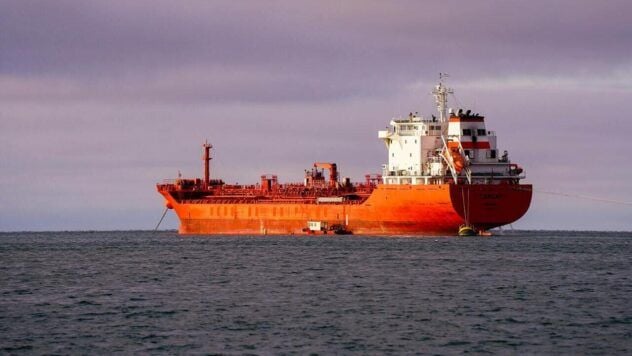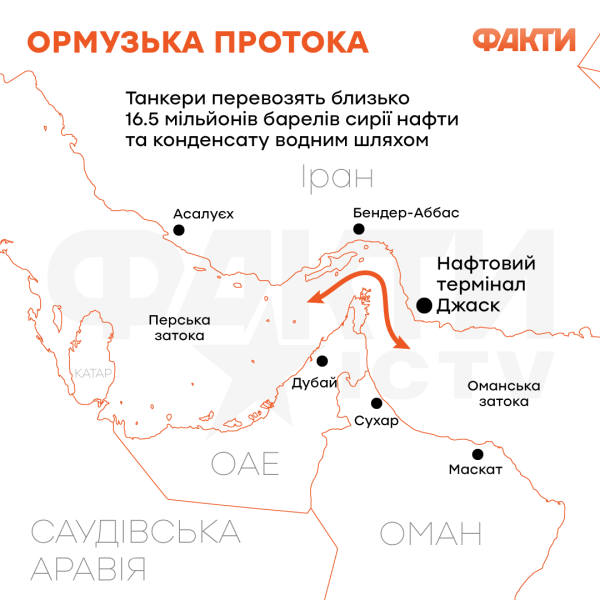
Iran is considering closing the Strait of Hormuz as one of the options for responding to the actions of its opponents. The country's authorities have previously repeatedly stated the possibility of closing the strait in the event of increased Western pressure.
ICTV Facts found out what will happen if Iran closes the Strait of Hormuz and how this will affect the oil market.
- Iran threatens to close Strait of Hormuz
- Where is the Strait of Hormuz located
- Who owns the Strait of Hormuz?
- Why is the Strait of Hormuz important?
- Impact of Strait of Hormuz Closure on Oil Prices
Iran threatens to close Strait of Hormuz
According to data Reuters Some commercial vessels began avoiding Iranian territorial waters near the Strait of Hormuz on Wednesday, June 18, signaling concerns in the shipping industry.
Now watching
Behnam Saeedi, a member of the presidium of the Iranian parliamentary National Security Committee, said that Iran has a number of options for responding to hostile actions, and one of them could be closing the Strait of Hormuz, depending on how events develop.
At the same time, another MP, Ali Yazdiha, noted that as long as Iran's vital national interests are not directly threatened, the country will allow free navigation in the region.
However, he warned that if the United States openly entered into an armed conflict on Israel's side, Iran would see fit to cut off Western oil trade as a form of pressure on Washington and its allies.
Yazdiha also added that Iran is currently refraining from such actions, since stable shipping in the Strait of Hormuz is beneficial not only to regional countries, but also to many countries around the world.
Where is the Strait of Hormuz located
The Strait of Hormuz is located in the southeast of the Middle East, between Iran to the north and Oman and the United Arab Emirates (UAE) to the south. It connects the Persian Gulf to the Gulf of Oman and then to the Arabian Sea and the Indian Ocean.
The Strait of Hormuz is 195 km long and its width varies between 55 and 95 km.

Infographic: ICTV Facts
The average depth is approximately 27.5 m, while at its deepest point it reaches 229 m. Among the main ports located near the strait are Bandar Abbas (Iran) and Al-Khasab (Oman).
The strait is an important point on the route between the oil-producing countries of the Persian Gulf (Iraq, Kuwait, Saudi Arabia, Qatar, UAE) and world markets.
Who owns the Strait of Hormuz?
The Strait of Hormuz is divided territorially between three countries. Its northern coast is under the control of Iran, while the southern part is adjacent to the United Arab Emirates and the Omani semi-enclave.
- Iran controls the northern coast of the strait.
- The UAE owns the southern coast.
- Oman includes the Musandam Peninsula, a semi-enclave that extends to the southern shore of the Strait of Hormuz.
Why is the Strait of Hormuz important?
The Strait of Hormuz is of key strategic importance because it is the choke point for most of the world's oil and natural gas supplies. It connects the Persian Gulf to the Gulf of Oman and the open ocean, serving as the only sea route for oil exports from most of the Middle East.
The strait carries approximately 20-30% of the world's seaborne oil exports, as well as significant volumes of liquefied natural gas. This makes the Strait of Hormuz extremely important for global energy stability.
Any disruption to shipping in the region could have serious consequences for the global economy, causing a sharp rise in the prices of oil and other energy resources.
Impact of Strait of Hormuz Closure on Oil Prices
In a commentary for ICTV Fakty, ExPro Consulting analyst Mikhail Svischo noted that the closure of the Strait of Hormuz will lead to a noticeable increase in oil prices on world markets – according to various estimates, up to $120-130/barrel.
— It is not yet clear to what extent Iran has a real opportunity to close the Strait of Hormuz. Despite threats, it has never been closed.
Firstly, the strait itself is quite wide, which makes a physical blockade difficult. Secondly, oil and LNG are received through the strait by both European and Asian buyers, in particular China, which is the main buyer of Iranian oil.
Closing the strait will hit Iran itself and lead to a deterioration in relations with countries, including possible new sanctions, noted Mikhail Svischo.
According to the analyst, there are pipelines that allow oil to be transported around the Strait of Hormuz. This is, of course, more expensive, but possible. Also, OPEC has been increasing oil production in recent months, and global oil reserves are high, which will soften the impact of any actions by Iran on prices.

